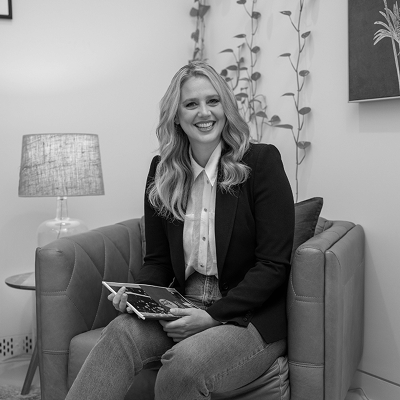
ASKING FOR A FRIEND
How do I redefine myself after time off, a rapidly changing industry landscape and amidst a world in turmoil?
ASKING FOR A FRIEND - QUESTION
Struggling to find your place after time off for personal loss and returning to a changed creative industry? Psychologist Tara Hurster and Creative Director Sarah Gross offer compassionate, practical advice on navigating grief while facing professional uncertainty. Learn why it's unrealistic to expect you'll be the same person, how AI won't replace human creativity, and why your new perspective is actually a strength. This honest discussion covers the stages of grief in professional transitions, focusing on what you can control, and finding your tribe in an evolving industry.
Coming Back Stronger: How to Redefine Yourself After Loss and Industry Change
Taking time off after personal loss only to return to a rapidly changing creative industry can feel overwhelming. When grief meets professional uncertainty, it's natural to question your place in a world that seems to have moved on without you. But this isn't about being left behind – it's about integrating your experiences into a new version of yourself.
This question was answered by Tara Hurster – Psychologist and Founder of The TARA Clinic – who specialises in supporting successful people through practical mental health solutions, and Sarah Gross – Creative Director and Partner at Storyfolk – who brings extensive experience in navigating industry changes while maintaining creative authenticity. Andy Wright from Never Not Creative hosted the discussion.
Understanding Grief in Professional Transitions
Tara explains that grief doesn't just happen from death – it occurs "when we're in a changing environment." You're experiencing two distinct losses: the personal grief from your situation and "grief and loss occurring at what once was an industry that you were doing and now you're coming back into that industry that has changed."
The stages of grief – denial, anger, bargaining, sadness, and acceptance – don't follow a neat order. "They don't have to go in order and you don't have to go through all of them," Tara notes. This process can "take healthfully anywhere between 12 to 18 months."
You've Changed, and That's Okay
When returning to work after significant personal loss, "it's actually unrealistic to have that expectation on ourselves" that we'll be the same person. Tara emphasises that both you and your industry have evolved, and expecting to slot back into your old role unchanged isn't fair to yourself.
The key is recognising that "this is now part of my story. It doesn't completely overwhelm me anymore." Acceptance isn't about forgetting what happened – it's about integrating your experience into who you are now.
AI Won't Replace Your Human Connection
Sarah addresses the industry fears directly: "I'm for it in the industry. I think there's many good things that will come from AI." However, she's confident that AI "is never going to replace the creative thinking and the strategy because design needs to connect with people."
The human element remains crucial because "we're selling things, we're launching brands, we're building things that people engage with. So the human element and connecting with the people is still really important."
Use Your New Perspective as Strength
Sarah acknowledges the profound shift that loss brings: "Everything felt mundane and pointless when you know there's much bigger things in life to focus on." But this perspective, while initially disorienting, can become a powerful creative tool.
Your lived experience and "the wisdom that you're having" will "help shape the way that you view the world and by extension the creative work." This isn't a disadvantage – it's a unique lens that can inform more meaningful, authentic creative output.
Focus on What You Can Control
Rather than being overwhelmed by "a tidal wave of things coming towards you all at once," Sarah suggests using a "decisional balance matrix" – essentially an extensive pros and cons list. Consider "what are the positives of changing" and "what's the negative of that."
The goal is "figuring out what you want from the creative industry and utilising this new era of your life" to shape your next steps. Focus your energy on actionable decisions rather than external uncertainties.
Find Your Tribe
Sarah emphasises the importance of "finding like-minded people and networks and opportunities." The creative industry still offers possibilities, despite the doom and gloom conversations. "What you put out there, you will get," so directing energy toward positive connections and opportunities yields better results than catastrophising.
How NNC Circles Can Support Your Transition
Never Not Creative Circles offer peer support groups specifically designed for creatives facing mental health challenges like yours. These confidential, non-competitive spaces connect you with other creatives who understand the unique pressures of returning to work after personal difficulties.
Meeting monthly with trained facilitators and 8-10 peers, Circles provide practical mental health education, group discussions, and action planning. The program requires a six-month commitment to build trust and lasting support networks.
For someone redefining themselves after loss and industry change, Circles offer a safe space to process your experiences, gain perspective from others who've faced similar challenges, and develop practical strategies for moving forward. Learn more about NNC Circles here.
Your Story Continues
Returning to the creative industry after personal loss and finding it changed doesn't mean you don't belong. It means you're bringing a richer, more complex perspective to your work. The industry needs people who understand that creativity serves something bigger than itself.
Your grief is valid, your concerns about industry changes are understandable, and your desire to find your place again is completely natural. Take the time you need to process both losses, but remember – you're not starting over. You're continuing your story with new chapters that will inform everything you create moving forward.
our guests
Industry Leader

Sarah Gross
Storyfolk
Mental Health Expert

Tara Hurster
Host

